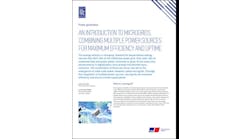By Elisa Wood
July 1, 2010
And now for a dose of reality.
No doubt smart meters are a good thing, but even their most ardent fans must admit that a degree of hoopla surrounds these little digital boxes. We hear that if consumers can just see how much power they use in real time, and what it costs, our energy woes will be no more.
Smart meters will even cure the blind. The energy blind that is.
“It can be difficult to separate the hype from legitimate claims,” said the American Council for an Energy-Efficient Economy in a new report that evaluates what works – and what doesn’t – when it comes to smart meters.
ACEEE points out that we no longer load the stove with coal and wood for our primary energy. Instead, gas and electricity flow unseen to take care of our needs. Since we see only a monthly bill, we have no idea what energy costs in real time, how much we use, or even the acceptable social norm for energy consumption.
Thus, most people in the US are “among the energy blind,” says the report. Asking us to save energy based on our monthly bills alone is like asking a dieter to lose weight without a scale. “Perhaps it can be done, but the task is a lot more difficult,” the report says.
But seeing how much energy we use is one thing; acting on it another. Smart meters will not do their job if we rely on the technology alone. The consumer needs good reason to act, according to ACEEE.
These findings are important because the US and other nations are making a huge investment in smart grid technology. Smart meters represented only about 4.7% of US household meters in 2008. But their market share is expected to grow to 40% over the next five to seven years, according to the report.
The report looked at 57 studies, three decades of research in Europe, North America, Australia and Japan, and found that smart meters can be effective. In fact, households using them have reduced electricity use 4% to 12%.
But much depends on how the meters present information and feedback and how we respond. Ultimately, the smartness of smart meters relies on utilities understanding human psychology.
The report offers several interesting insights about our energy behaviour. For example:
- We are less apt to respond to programs that focus on reducing energy at specific times (peak periods when costs are high) than reducing energy all the time.
- We need to feel our actions truly make a difference.
- An energy crisis is more likely to motivate us to conserve than arguments about climate change, especially if we live in the US.
- Smart meters may be unnecessary. We like our cell phones, and if only 20% of US consumers used them to manage household energy use, we could significantly reduce energy waste.
- We need feedback on a long-term basis to continue to save energy.
- When we receive feedback on energy use, we tend to change our habits and make small changes like installing weather stripping. To a lesser degree, we replace appliances, although they offer the most energy savings.
There has been a lot of talk about how smart grid will marry two giant industries: energy and information technology. True. But the ACEEE study makes apparent that a third field needs to play a big role: behavioural science.
“The bottom line here is very simple: Smart meters in and of themselves are just not ‘smart’ enough to get the job done for consumers and our economy. While advanced metering provides a useful tool to save energy, cut consumer electric bills and reduce greenhouse gas emissions from power plants, utilities need to use these advanced meters to provide consumers with information on their consumption in ways that grab consumers attention and encourage them to take action,” said John “Skip” Laitner, ACEEE’s director of economic and social analysis.
The report can be found at http://www.aceee.org/press/e105pr.htm
Visit www.realenergywriters.com to pick up a free Energy Efficiency Markets podcast and newsletter.





